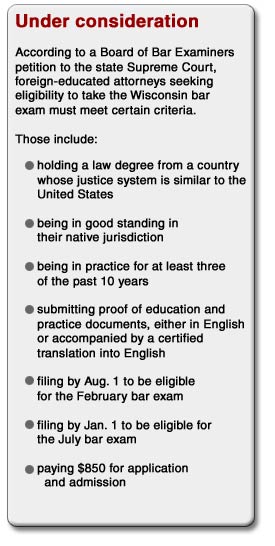Board of Bar Examiners seeks clarity for foreign-educated attorneys
By: Jack Zemlicka, [email protected]//November 23, 2011//
Board of Bar Examiners seeks clarity for foreign-educated attorneys
By: Jack Zemlicka, [email protected]//November 23, 2011//
Wisconsin’s Board of Bar Examiners wants clearer guidelines when determining the eligibility of foreign-educated attorneys for the bar exam.
The BBE on Nov. 18 petitioned the state Supreme Court to adopt specific criteria and costs for lawyers from outside the United States who want a Wisconsin license.
“I think there is less discretion with the proposed petition than there is now,” BBE Director Jacquelynn Rothstein said.
Two years ago, the court denied a broader petition for foreign-educated attorneys who want to take the state bar exam. In doing so, the court directed the BBE to instead consider granting waivers to those attorneys.
 But the justices did not include criteria for evaluating applicants or list the materials foreign-educated lawyers should submit to warrant consideration.
But the justices did not include criteria for evaluating applicants or list the materials foreign-educated lawyers should submit to warrant consideration.
Mexican-born attorney Cynthia Herber is among the foreign-educated lawyers who have applied to take the bar exam in Wisconsin under the current system.
Lacking specific guidelines in applying for a waiver in April, Herber said, she submitted transcripts of her degree from Universidad Anahuac in Mexico, a proclamation from former Wisconsin Gov. Jim Doyle regarding her appointment to the Wisconsin Judicial Council and anything else that would improve her chances.
Herber’s petition was granted, she passed the exam in July and in November was sworn in.
She said not having a clear rule left her in the dark as far as what to submit to the BBE and how it would be evaluated.
“I knew what I thought should be looked at,” Herber said. “But it’s hard to say what would have been had there been a rule in place when I applied.”
Of the 28 foreign-educated lawyers who have applied to take the exam during the past two years, 19 petitions were granted, according to Rothstein. Eleven people took the exam and seven passed, she said.
Thomas Boykoff, a BBE member and retired Madison attorney, said the applications the board has received from foreign-educated attorneys have covered a wide range, from comprehensive packages to those submitted entirely in a foreign language.
In the two years since the court directed the BBE to evaluate applicants, he said, the board has developed an informal list of guidelines. But, Boykoff said, the proposed rule would decrease subjectivity both for the BBE and applicants.
Boykoff declined to speculate on whether more applicants would have been approved or rejected had specific criteria been in place. However, he said, a clear rule would at least let people understand the expectations.
“Right now,” Boykoff said, “people are sort of left guessing.”
Rothstein said the current system of evaluating foreign-educated applicants leaves room for interpretation, but she did not go so far as to call it a flawed process.
Boykoff agreed but said even if the court accepts the petition, there still will be some element of discretion.
“Some of the subjectivity will be removed, but subjectivity is not always bad,” he said. “If we were that hard-nosed, we’d not be accepting any foreign-born applicants.”
Legal News
- Some State Bar diversity participants walk away from program
- Wisconsin court issues arrest warrant ‘in error’ for Minocqua Brewing owner
- Iranian nationals charged cyber campaign targeting U.S. Companies
- Facing mostly white juries, are Milwaukee County defendants of color truly judged by their peers?
- Milwaukee Mayor speaks in D.C. Tuesday at White House water summit
- Chicago man sentenced to prison after being caught with ‘Trump Gun’
- FTC bans non-competes
- Gov. Evers seeks applicants for Dane County Circuit Court
- Milwaukee man charged in dismemberment death pleads not guilty
- Democratic-led states lead ban on the book ban
- UW Madison Professor: America’s child care crisis is holding back moms without college degrees
- History made in Trump New York trial opening statements
WLJ People
- Power 30 Personal Injury Attorneys – Russell Nicolet
- Power 30 Personal Injury Attorneys – Benjamin Nicolet
- Power 30 Personal Injury Attorneys – Dustin T. Woehl
- Power 30 Personal Injury Attorneys – Katherine Metzger
- Power 30 Personal Injury Attorneys – Joseph Ryan
- Power 30 Personal Injury Attorneys – James M. Ryan
- Power 30 Personal Injury Attorneys – Dana Wachs
- Power 30 Personal Injury Attorneys – Mark L. Thomsen
- Power 30 Personal Injury Attorneys – Matthew Lein
- Power 30 Personal Injury Attorneys – Jeffrey A. Pitman
- Power 30 Personal Injury Attorneys – William Pemberton
- Power 30 Personal Injury Attorneys – Howard S. Sicula











